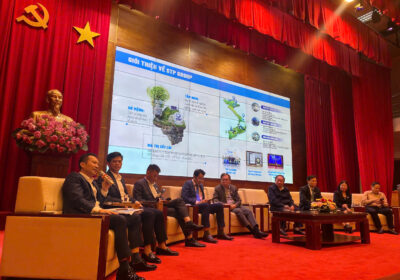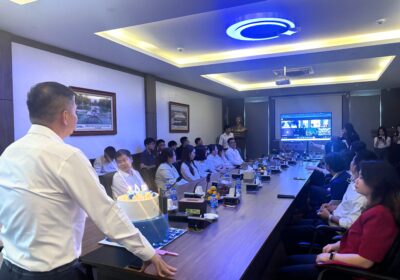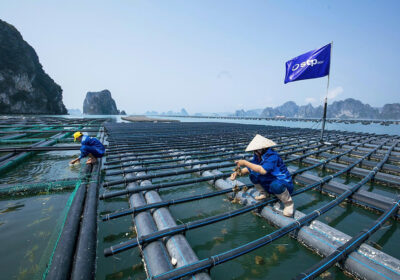The Dutch Fund for Climate and Development (DFCD) intends to partner with STP, a leading supplier of HDPE aquaculture materials, to develop a first-of-its-kind 150ha sustainable seaweed farm model, enhancing marine biodiversity, climate resilience and livelihoods for marine farming communities in North Vietnam.
STP is one of the top producers of HDPE (High Density Polyethylene Equipment) and infrastructure in Vietnam. The company is a pioneer in the development of sustainable aquaculture farm models, with environmental protection and innovation as top priorities.
The project with STP has been put forward by the World Wide Fund for Nature Netherlands (WWF-NL) as a new project within the Dutch Fund for Climate and Development. WWF-NL manages the DFCD’s Origination Facility, together with SNV, a global development partner, to develop new projects for the climate investment fund. WWF-NL intends to sign a €256,100 grant funding agreement with STP, and together with WWF Vietnam, they will carry out activities to begin the expansion of STP’s aquaculture model, enhancing biodiversity, climate resilience and livelihoods for marine farming communities in North Vietnam.
Climate change threatens Vietnam’s coasts
Climate change poses a major threat to the Vietnamese economy and environment: Northeast Vietnam is vulnerable to sea-level rise, coastal erosion and saline intrusion, with the coastal regions in Quang Ninh facing severe environmental degradation. Bai Tu Long Bay in Quang Ninh is an area notable for its rich marine biodiversity, pristine ecosystems, and strategic importance in Vietnam’s aquaculture development plan. It is adjacent to the UNESCO World Heritage Site Ha Long Bay, and is designated as a key aquaculture zone, with 90% of Quang Ninh’s 45,000-hectare aquaculture area planned within its boundaries.
Marine farming is a traditional industry there with significant economic importance. However, it is made up mostly of small-scale operations that focus on a few single-value activities which have caused considerable negative impacts on the natural environment and social communities. Formalising an integrated supply chain, and boosting its sustainability, would have profound effects on the livelihoods of coastal communities, climate resilience and marine biodiversity.
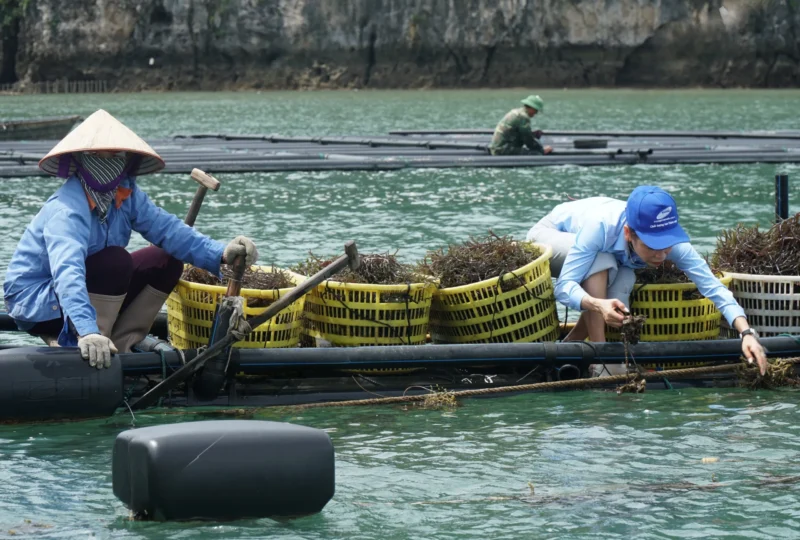
Environmental protection with innovative seaweed farming
Super Truong Phat Plastic Group Joint Stock Company (STP), headed by CEO Ms. Nguyen Hai Binh, is part of the STP Group. Established in 2011, they are one of Vietnam’s leading companies in High-Density Polyethylene (HDPE) products. STP are highly conscious of the need to protect the coasts of Quang Ninh and beyond, and to do so have become the first corporate in Vietnam to acquire a lease license from the government for marine farming.
Traditionally, marine farming in Vietnam relies on the use of wooden or bamboo cages floated by foam buoys. These buoys require frequent replacement and the use of chemicals to clean the algae from structures. As the buoys degrade, they also release microplastics into the water.
STP approach marine farming differently: In 2022/23, they piloted a three-hectare sustainable floating farm with integrated seaweed and mollusc cultivation. By switching out traditional infrastructure for durable HDPE infrastructure, it lasts longer and can be more easily replaced and recycled. These structures are then integrated with seaweed and molluscs – two highly effective natural filters – which improve water quality and restore biodiversity, while providing sustainable livelihoods for coastal communities. Furthermore, by transitioning from traditional monoculture aquaculture to integrated seaweed and shellfish farming, ecosystem resilience is enhanced. Together with WWF, this concept will be expanded to a five-hectare pilot initiative.
Working with DFCD
The new integrated seaweed-mollusc pilot of five hectares will prepare STP for an eventual scale up of 150 hectares. They will carry out activities aimed at ensuring better outcomes for farmers, increasing gender empowerment, as well as monitoring and evaluating water quality, carbon sequestration and marine biodiversity impact. Specifically, grant funding will be used for the following:
- Fair Pricing Study and Environment & Social risk assessment
- Gender and Minority Engagement and Empowerment
- Cooperative Development and Capacity Strengthening
- Investment of 5ha Module of Seaweed Integrated Mollusc Model and the Preparation for Expanding 150ha
- Monitoring and Evaluation
By securing the investment necessary to complete their larger expansion plan, the following impacts are predicted:
- 150 hectares of marine habitat sustainably managed, with improved water quality, with potential for up to 800 hectares pending approval of new license applications
- Direct benefits to 200 workers, with 500+ indirect jobs and expected 30–50% income increase
- Increased participation of women in aquaculture, particularly in processing and marketing, improving financial independence
- Enhanced ecosystem resilience with the potential for widespread replicability
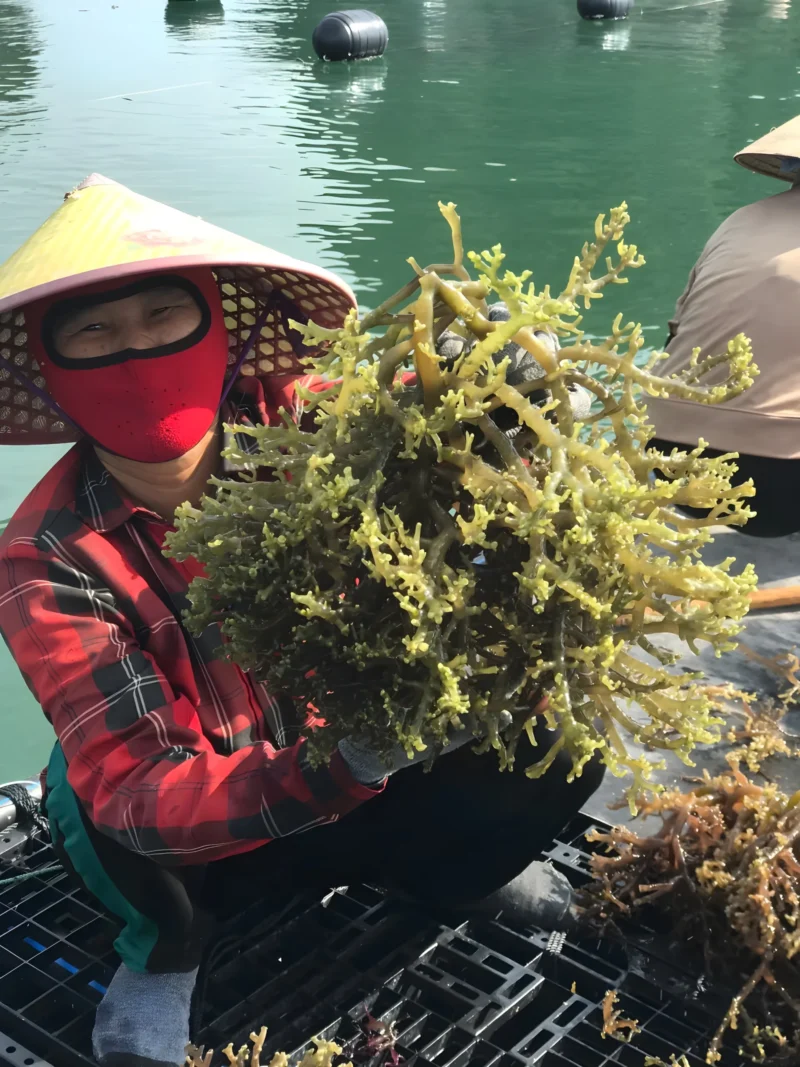
“STP are the perfect group to be part of the DFCD OF. They have the knowledge and strength of a successful HDPE business coupled with the vision of ocean protection and community sustainability. The team works closely with the Vietnamese Government the intercropping of seaweed and molluscs leads to improved climate resilience. The natural synergy between the two improves water quality, add to biodiversity and leads to ecosystem restoration, therefore creating stable income opportunities.”– Stuart Beavis, DFCD Regional Lead for Asia.
Contact
For more information, contact Stuart Beavis, DFCD Regional Lead for Asia, at sbeavis@wwf.org.hk. In case you have any grievances in relation to this project of the DFCD’s Origination Facility, please contact us through our service desk at servicedesk@wwf.nl.
About STP
STP GROUP is one of the leading plastic enterprises in Vietnam, with over a decade serving domestic and foreign markets. In addition to providing the necessary infrastructure, they also pioneer the development of sustainable aquaculture models.
About DFCD
The Dutch Fund for Climate and Development (DFCD) is a climate fund, dedicated to supporting climate adaptation and mitigation projects which benefit vulnerable communities and landscapes. Initially funded by the Dutch government, it is powered by a consortium of four expert organisations: FMO (Dutch Entrepreneurial Development Bank), CFM (Climate Fund Managers), SNV, a global development partner, and WWF Netherlands.



